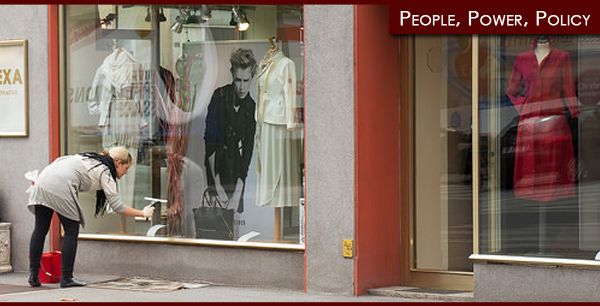by Alex Wood and Brendan Burchell
For many critics, the growth of insecure work is evidence that United Kingdom (UK) government’s economic policies are failing. It is argued that the declining unemployment of the past 18 months, which the government vaunts as evidence that the UK is back on track to a full economic recovery, is largely due to people accepting the low-quality jobs that have proliferated since the onset of the ‘Great Recession’. For many in the UK, the precarious nature of much of this work is epitomized by so-called ‘zero hours employment’.

There is no legal definition of zero hours employment, but the government’s Department of Business Innovation and Skill understands it as employment “in which the employer does not guarantee the individual any work, and the individual is not obliged to accept any work offered.”[1] This description suggests that under such arrangements, both employers and employees have equal and reciprocal rights. In practice though, low-end workers with little labor-market bargaining power and few alternatives have little choice but to accept the diktats of their employer and do any work offered to them. Despite working whenever their employer demands, they have no guarantee of future work, and thus their income is unpredictable and insecure.
Interestingly, such employment has always existed in the UK for some workers, but it has only become the focus of major media and political interest in the past 18 months. In July 2013, the Guardian ran an exposé on a major retailer that was employing 90 percent of its 23,000-strong workforce in this manner. Zero hours employment has been a dominant theme of critical narratives ever since. For example, late last year, Ed Miliband, leader of the Labour Party, declared the country to be “Zero-Zero Britain – a country of zero hours contracts for the poor and zero tax for the rich.”[2]
Given the recent rise to prominence of zero hours employment as a political issue, one would be forgiven for thinking that this indicates that the number of people employed in this manner has skyrocketed in recent years. In fact, the official statistics show that although the number of zero hours workers increased by nearly 50 percent between 2010 and 2012, this still only equaled 250,000 workers – or less than 1 percent of the labor force – and only 25,000 more workers more than in 2000.[3] Does this paradox then mean that the critics have got it all wrong and that they are making a mountain out of a molehill? We think not. The discourse surrounding zero hours employment has clearly touched upon something to which many people can relate. However, by being fixed upon zero hours employment, the debate is too narrowly focused. Instead, we need to think about the issues at the heart of the zero hours. What has propelled this issue into the headlines is the insecurity, anxiety, and stress that people experience when their working time is unpredictable and determined by their employer. Yet these experiences are not only characteristic of zero hours employment; they are actually common to other, far more prevalent forms of employer-driven flexible employment, which “allow front-line managers to keep a tight link between fluctuations in demand and labour costs by varying the number and timing of employees’ work hours.”[4]
Pertinently, these employer-driven flexible scheduling (EDFS) practices have been identified as detrimental to several aspects of job quality, including job security.[5] Unfortunately, there is little data on levels of employer-driven flexible scheduling, and thus little is known about its prevalence or how it has changed over time. But the 2005 and 2010 waves of the European Working Conditions Survey (EWCS) provide a unique time series on the number of workers who have their schedules altered regularly by their employer. An initial analysis of this data finds that employer-driven flexible scheduling increased significantly – more than 2 percentage points (pp) – in 11 out of the 15 Western European countries for which there are data. Moreover, the biggest increase was in the UK, where the number of workers experiencing this practice increased by 7 pp to 24 percent. This suggests that the increased concern over the problems associated with insecure scheduling is well placed, but has been misconstrued as a problem specifically surrounding zero hours employment.
The changes across Western Europe do not, however, neatly conform to expectations derived from previous research. Following the ‘varieties of capitalism’ and ‘employment regimes’ in ‘coordinated market economies’, employer-driven flexible scheduling is constrained by institutions such as works councils and trade unions. These institutions require employers to post schedules in advance and negotiate scheduling.[6] In fact, in more than 60 percent of European firms, managers and employee representatives claim that company-level employee representation has had either a quite strong or very strong influence on changes in working time. In the ‘liberal market economies’ of the UK and Ireland, this figure was approximately 15 percent lower than in Germany – the country with the highest level of involvement.[7]
Our initial analyses of the 2005 and 2010 data is partly in line with this finding, as the coordinated market economies of the Netherlands (2005: 12 percent and 2010: 11 percent), Norway (14 percent/16 percent), and Sweden (15 percent/18 percent) have some of the lowest levels of employer-driven flexible scheduling. These figures are, nevertheless, higher than expected considering the findings of previous research that emphasizes the role of collective bargaining constraining employer-driven flexible scheduling. Even more surprising is that Denmark (20 percent/23 percent) has average levels, similar to the ‘liberal market’ economies of the UK (17 percent/24 percent) and Ireland (21 percent/23 percent). Additionally, Germany (30 percent/32 percent), Finland (28 percent/24 percent), and France (23 percent/28 percent) were included in the top five countries for employer-driven flexible scheduling in both 2005 and 2010. Furthermore, the increases do not track unemployment in a simple fashion. For example, the biggest increases in EDFS were in the UK (7 pp), France (6 pp), Luxemburg (5 pp), and Austria (5 pp), although Austria and Luxemburg had relatively low levels of unemployment, and the UK and France had average levels, while Ireland (2 pp) had the third-lowest increase in EDFS despite having one of the highest increases in unemployment.
Little is known about the drivers of these employment practices. This raises the question of whether employer-driven flexible scheduling is simply a consequence of the ‘Great Recession’ or if it represents a more fundamental transformation in the nature of contemporary capitalism. There is some evidence that EDFS has increased due to its use as a cost-containment strategy by employers. Employers have been found to be increasingly unwilling to pay for labor that exceeds demand on a daily or even hourly basis.[8] Some researchers have argued that this tendency represents a long-term trend toward a new capitalist “temporality,”[9] a general and widespread “deregulation of the workplace,”[10] or partly a consequence of a general movement toward “global labour flexibility.”[11] However, the degree to which such tendencies, if they exist at all, are spatially confined and dependent on specific economic, labor-market and institutional conditions is equivocal. Alternatively, the ‘Great Recession’ may have created an economic context of fertile labor-market conditions (unemployment, underemployment, and insecurity) for the growth of such employment practices, but which is being mediated in complex ways by the differing institutional contexts across Western Europe. Therefore, these increases in EDFS, rather than being part of a long-term trend toward a new temporality, may instead fade with economic recovery.
Therefore, further research is needed to investigate how the growth of employer-driven flexible scheduling is mediated by differing spatial conditions and institutional arrangements. The best approach for this is, perhaps, that of ‘variegated capitalism’, which seeks to understand the ‘causes and forms of capitalism’s dynamic polymorphism’ through a consideration of the spatially uneven and combined development of capitalist tendencies across what are necessarily qualitatively different contexts.[12] It is also important to understand which types of employees are most at risk of experiencing employee-driven flexible scheduling so that more can be done to protect specific groups of workers. Therefore, future analysis must also differentiate data by gender, age, occupation, industry, and education. Finally, at present, the EWSC only provides two time periods, due to rewording of the question in both 1995 and 2000; therefore, the publication of the 2015 data will provide further evidence of whether we are witnessing a new capitalist temporality or not.
Alex Wood is is a Research Associate and PhD Candidate in the Department of Sociology at the University of Cambridge, and a member of Darwin College. His research focuses on insecure and flexible work and new patterns of employment and industrial relations.
Brendan Burchell is a Reader in the Department of Sociology at the University of Cambridge, and a Fellow of Magdalene College. His research interests include job quality, gender, self-employment and the effects of labour markets on individuals’ wellbeing. He is also director of the Cambridge Undergraduate Quantitative Methods Centre (CUQM).
This article is part of our feature People, Power, Policy.
[1] Department of Business Skills and Innovation, Consultation: Zero Hours Employment Contracts (London: Department of Business Skills and Innovation, 2013).
[2] <www.theguardian.com/politics/2014/nov/12/miliband-fightback-labour-victims-zero-zero-britain>.
[3] Mark Chandler and Ruth Barrett R, Estimating Zero-Hour Contracts from the Labour Force Survey (London: Office for National Statistics, 2013).
[4] Susan J. Lambert, “Passing the Buck: Labor Flexibility Practices that Transfer Risk onto Hourly Workers,” Human Relations 61, no. 9 (2008): 1203–27.
[5] See Françoise Carré, et al., “Retail Jobs in a Comparative Perspective,” in Low-Wage Work in the Wealthy World, eds. Jérôme Gautié and John Schmitt (New York: Russell Sage Foundation, 2010): 211–68; and Alex Wood and Brendan Burchell, Zero Hour Contracts as a Source of Job Insecurity (Cambridge: University of Cambridge Individual in the Labour Market Report, 2014).
[6] Françoise Carré, et al., “Retail Jobs in a Comparative Perspective.”.
[7] Arnold Riedmann et al., European Company Survey 2009: Overview Report (Dublin: Eurofound, 2014).
[8] See, for example, Susan J. Lambert, “Passing the Buck,” and Jill Rubery et al., “Working Time, Industrial Relations and the Employment Relationship,” Time & Society 14, no. 1 (2005): 89–110.
[9] Jill Rubery et al., “Working Time.”
[10] Christine Everingham, “Engendered Time: Gender Equity and Discourses of Workplace Flexibility,” Time & Society 11, no. 2–3 (2002): 335–51.
[11] Guy Standing, Global Labour Flexibility: Seeking Distributive Justice (Basingstoke: Palgrave Macmillan, 1999).
[12] Jamie Peck and Nik Theodore, “Variegated Capitalism,” Progress in Human Geography 31, no. 6 (2007): 731–72.
Note: This post was originally published on Critcom on the 16th September 2015.
